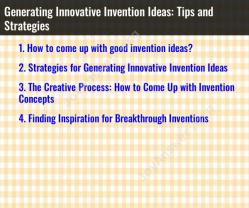Can you make money with your idea or invention?
Yes, you can make money with your idea or invention if you take the right steps to bring it to market and capitalize on its potential. Here are some strategies for monetizing your invention or idea:
Patent and Protect Your Invention: Start by securing intellectual property rights for your invention through patents, trademarks, or copyrights. This protection can prevent others from using or copying your idea without your permission.
Licensing Your Invention: One common way to monetize an invention is to license it to other companies. You can grant them the right to use, manufacture, or sell your invention in exchange for licensing fees or royalties. This approach allows you to leverage the expertise and resources of established businesses.
Manufacture and Sell: If you have the resources and expertise, you can manufacture and sell the product yourself. This involves building a business around your invention, including product development, manufacturing, marketing, and distribution. You can sell your product directly to consumers or through retailers.
Online Sales: Consider selling your invention or related products through online platforms such as e-commerce websites, marketplaces like Amazon or eBay, or your website. Online sales can reach a broader audience.
Crowdfunding: Platforms like Kickstarter and Indiegogo offer opportunities to raise funds for product development by pre-selling your invention to backers. This can provide the initial capital needed to bring your idea to market.
Start a Business: If your invention has the potential to become a successful product or service, you can start your own business. This may involve creating a business plan, seeking investors or loans, and building a company around your invention.
Sublicensing: If your invention has multiple applications or can be used in various industries, you can sublicense it to different companies within those sectors. This can result in multiple revenue streams from a single invention.
Consulting and Services: Offer consulting or services related to your invention. For example, if you've developed a software application, you can offer training, customization, or support services to users.
Affiliate Marketing: If your invention complements existing products or services, you can explore affiliate marketing partnerships with companies in your niche. You earn a commission for driving sales or leads to these businesses.
Franchising: If your invention involves a unique business concept, consider franchising it to expand its reach and generate income through franchise fees and royalties.
Joint Ventures and Partnerships: Collaborate with other businesses or entrepreneurs to bring your invention to market. They can provide resources, distribution channels, or complementary products that enhance your invention's success.
Advertising and Sponsorship: If you have a digital invention or a platform with a significant audience, monetize it through advertising, sponsored content, or affiliate marketing.
Trade Shows and Expos: Showcase your invention at trade shows, expos, and industry events to attract potential investors, partners, or customers.
Remember that successfully monetizing your invention often requires a combination of strategies, dedication, effective marketing, and ongoing innovation. It's essential to research your target market, understand your competition, and be flexible in your approach as you navigate the challenges of turning your idea into a profitable venture.
Exploring the potential for making money with a new idea or invention
There are a number of ways to make money with a new idea or invention. One way is to start your own business and market and sell your invention yourself. Another way is to license your invention to an established company that has the resources to manufacture and market it. You can also sell your invention outright to another company.
The potential to make money from a new idea or invention depends on a number of factors, including the marketability of the invention, the cost of developing and marketing it, and the level of competition.
The process of assessing the market viability of an invention
The first step in assessing the market viability of an invention is to conduct market research. This involves identifying your target market and determining the size of the market and the level of demand for your invention. You should also conduct a competitive analysis to identify any existing products or services that are similar to your invention.
Once you have conducted your market research, you can use the information to develop a business plan and financial projections. The business plan should outline your marketing strategy and how you plan to generate revenue from your invention. The financial projections should estimate your costs and revenue to determine the profitability of your business.
Protecting and patenting your idea to maximize its earning potential
If you believe that your invention has the potential to be successful, you should consider protecting it with a patent. A patent gives you the exclusive right to make, use, and sell your invention for a period of 20 years. This can prevent others from copying your invention and competing with you.
The patent application process can be complex and time-consuming, so it is important to consult with an experienced patent attorney.
Strategies for licensing or selling your invention to established companies
If you do not have the resources to manufacture and market your invention yourself, you may want to consider licensing your invention to an established company. Licensing involves granting another company the right to make, use, and sell your invention in exchange for a royalty.
To license your invention, you will need to develop a licensing proposal that outlines the terms of the agreement. You should also identify potential licensees and contact them to discuss your proposal.
Another option is to sell your invention outright to an established company. This is a more straightforward process than licensing, but you will typically receive less money than if you licensed your invention.
Balancing financial expectations and risks associated with inventing
Inventing can be a risky endeavor. There is no guarantee that your invention will be successful, and there can be significant costs associated with developing and marketing it.
It is important to balance your financial expectations with the risks involved. You should also be prepared to invest your own time and money into your invention, and you should have a backup plan in case your invention is not successful.
If you are considering pursuing a career as an inventor, it is important to carefully weigh the potential rewards and risks involved.




